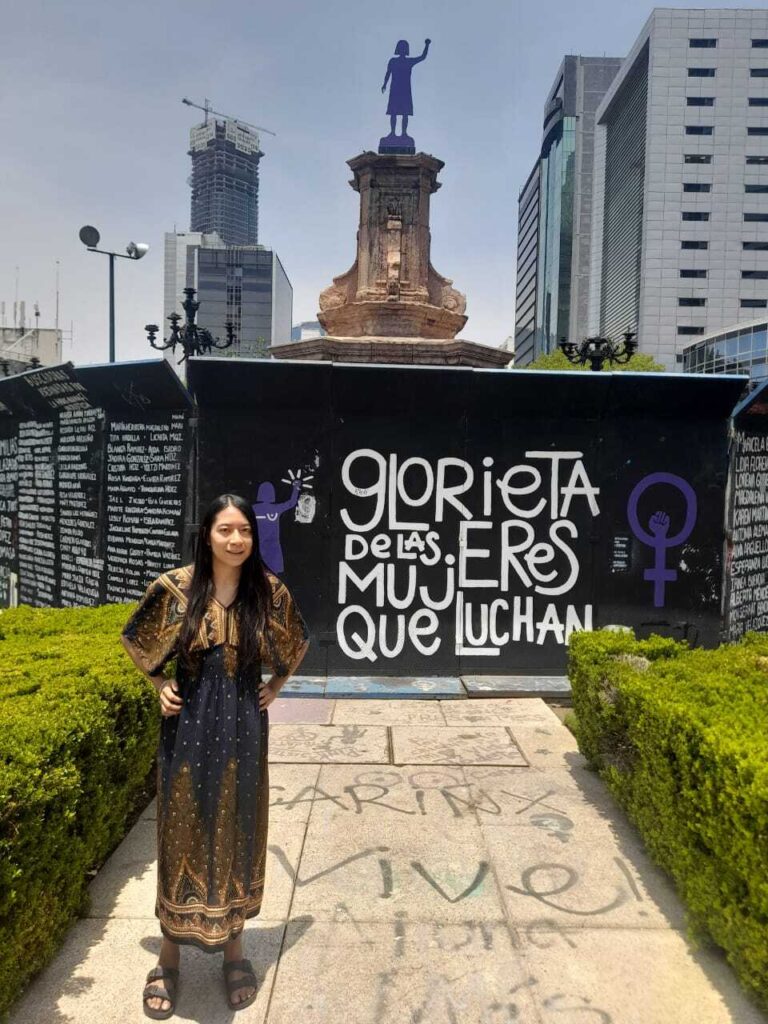By Dinorah Arceta Casanova, one of our ‘Walkie-Talkies’
From August 10 to 15, 2025, Mexico City hosted the XVI Regional Conference on Women in Latin America and the Caribbean (RCW), a key regional governance space that brought together governments, civil society, international organizations, parliamentarians, and social movements under the theme of “the care society.” This edition unfolded in a complex context marked by rollbacks in women’s rights, attacks and violence against feminist movements, defunding of institutions and women-led organizations, and regressive narratives on gender equality and sexual diversity in several countries across the region.[1]
Against this backdrop, examining the role of Feminist Foreign Policies (FFPs) was crucial, since some governments—such as Mexico, Colombia, and Chile—have formally committed to adopting this approach, while others, like Bolivia, are still in the process of developing it. The RCW offered an opportunity to critically assess whether these policies are truly meeting the real needs of women in the territories, or whether they risk becoming symbolic frameworks without transformative impact.
Feminist movements in the region demand fiscal justice and accountability
As is tradition at the RCW, civil society organized in advance to reflect collectively and coordinate strategies regarding the state of women’s rights from the perspective of the territories. For more than six months, feminists from Latin America and the Caribbean prepared the Feminist Forum, which on August 10 brought together more than 400 women. The final declaration, drafted collectively, denounced the fact that the profound inequalities faced by women in the region are rooted in power relations inherited from colonialism, now expressed through new forms of neocolonialism such as extractivism, perpetual indebtedness, and the dispossession of common goods.
It also criticized the inaction of States and multilateral organizations in the face of wars, genocides, and humanitarian crises such as in Palestine, Yemen, Haiti, and Ukraine, while demanding a feminist fiscal policy that redistributes public resources to those who have been historically excluded. In addition, horizontal dialogue spaces such as the “Care Pavilion” were created to exchange solutions from the territories that place care and the sustainability of life at the center, using intersectional approaches that include anti-racism, anti-ableism, and Indigenous Peoples’ perspectives.
On feminist foreign policy specifically, the message was clear: adopting an FFP is not enough if it does not translate into concrete actions with tangible results in fiscal justice, peacebuilding, and the eradication of structural inequalities. FFPs must be real tools for transformation, not merely symbolic frameworks. In the face of growing antifeminist backlash in the region, participants called for unity within the Latin American and Caribbean feminist movement and urged States and actors promoting FFPs as “international models” not to remain silent in the face of rollbacks in Latin America and the Caribbean, as silence implies complicity.
The abandonment of the “feminist” label in FFPs?
At least three side events at the XVI RCW addressed the progress of FFPs in the region. During the panel “Contributions of Feminist Foreign Policy to the construction of care societies in Latin America and the Caribbean” it was highlighted that the concept of care as a right has been developed by feminist movements for years—with milestones such as its inclusion in the 2010 Brasilia Consensus—but it was the COVID-19 pandemic that demonstrated globally that “care sustains life,” prompting its inclusion in international agendas.
In Latin America and the Caribbean, FFP has contributed to the creation of the Global Alliance for Care and the Seville Commitment. However, the dismantling of gender institutions and rollbacks in international cooperation pose serious threats to the rights and lives of many women. In multilateral spaces, terms such as “women” and “gender” face growing resistance, creating challenges for maintaining a feminist approach without losing its essence. It was therefore underlined that FFP must generate concrete results, such as integrating care into macroeconomic policies, even if this means advancing without explicitly using the “feminist” label. In this sense, care could serve as a strategic entry point for the feminist agenda, despite the resistance the term still provokes.
At the event, “Do Feminist Foreign Policies contribute to advancing women’s rights and gender equality?”, feminists from Chile, Colombia, Argentina, Bolivia, and Mexico offered a critical evaluation of the impact of FFPs in their countries. They stressed the need to build a Latin American model rooted in the care society, South-South cooperation, and the eradication of structural violence—including sexual and armed violence and securitized approaches to migration—from a participatory perspective strongly anchored in feminist social movements.
Speakers highlighted that many of the agendas promoted under FFPs are not new, but rather stem from historical struggles. To be truly feminist, these policies must integrate the priority issues of feminist movements both within and beyond territories. They emphasized the importance of ensuring that international women’s rights instruments do not remain mere formal commitments but are applied to transform living conditions locally.
Participants questioned the coherence of international leaders who promote a feminist image while undermining rights at the national and local levels. They also denounced the lack of meaningful participation in the development of FFPs, particularly in Mexico Silence from some governments on rollbacks in sexual and reproductive rights and on the advance of militarization was also criticized. Finally, participants called for institutions linked to FFPs to be provided with resources, political strength, and close ties to women’s movements, including recognition of women diplomats as rights-holders who also face gender-based violence in the workplace.

Another noteworthy side event, “Feminist foreign policies and the care society: towards a Latin American model that promotes women’s autonomy”, organized by the Mexican government, focused on the institutional dimension of FFPs. It presented, as best practice, the UNDP Gender Equality Seal, which certifies institutions that incorporate gender equality into their structures and processes, contributing to the fulfillment of SDG 5 and strengthening institutional capacities in foreign policy. The event also showcased the project “Strengthening Feminist Foreign Policy and Feminist International Cooperation,” aimed at consolidating the capacities of the Foreign Ministries and International Cooperation Agencies of Chile, Colombia, Mexico, and Germany to design gender-sensitive policies.
Meanwhile, it was noted that Mexico, almost a year after announcing its FFP program and developing it with limited participation—restricted to a survey and a civil society consultation—finally presented concrete advances from the Foreign Ministry. The program seeks to promote substantive equality in all areas of foreign policy through five priority actions in five key areas, including two subsecretariats (Foreign Affairs and Latin America and the Caribbean) that previously had not contemplated initiatives framed within the FFP narrative.
This shows that, although still in its early stages, FFP continues to consolidate as a regional trend, employed by some countries and international organizations to project global leadership.
Tlatelolco Commitment: an FFP instrument?
The documents The Care Society and The Tlatelolco Commitment represent the main outcomes of the XVI RCW. Although these were instruments negotiated primarily by governments, some feminists from civil society managed to participate in negotiation tables and plenary debates.
The case of Mexico stood out: for the first time in years, no public call was issued to form the national delegation. Instead, the Ministry of Foreign Affairs and the Ministry of Women selected participants discretionally, breaking with past practices that had ensured collective and transparent civil society participation in negotiation spaces.
Despite these limitations, the final document managed to incorporate key civil society observations, particularly those underscoring the States’ unavoidable responsibility to mobilize public resources ambitiously to guarantee rights, including the right to care.
Various organizations had expressed concern over a possible weakening of the Tlatelolco Commitment’s language, particularly regarding public financing as an essential condition for moving toward a care society. Unlike past commitments, there was a worrying tilt toward private financing mechanisms, which contradict the principles of guaranteeing rights for women and marginalized groups.
In the end, a clear reference to public financing was included, affirming that while private investment may be complementary, it must take the form of progressive tax contributions within the framework of a fiscal pact that avoids reproducing inequalities stemming from the privatization and financialization of public services.
Regarding FFP specifically, the Tlatelolco Commitment maintained the language agreed upon in the Buenos Aires Commitment, encouraging the adoption of FFPs according to each State’s priorities, and guaranteeing the full, effective, and meaningful participation of women in diplomacy and international forums.
Conclusions
It is essential to continue leveraging regional governance spaces to foster more grounded, context-sensitive discussions on the real usefulness of feminist foreign policies for women. These spaces, especially multistakeholder regional forums, are crucial because they provide civil society with a dedicated platform for participation and direct engagement with governments, where demands can be voiced and solutions proposed.
Unlike global multilateral diplomacy—still heavily shaped by the coloniality of knowledge and power—these regional spaces allow feminist voices from the territories to take center stage. The RCW is emblematic in this regard: a forum conceived in the Global South and for the Global South, driven by Latin American feminisms, which has enabled the positioning of a homegrown agenda in response to regional challenges.
Faced with growing antifeminist backlash both regionally and globally, it is urgent that FFPs contribute to building a Latin American feminist voice articulated between civil society and other influential actors—a voice that is authentic, collective, and deeply rooted in the realities of the Global South.
[1] Gender-related rollbacks have been observed in Argentina, El Salvador, Peru, Ecuador, Venezuela, Dominican Republic, Nicaragua
The ‘Walkie-Talkies’ are feminists with expertise and lived experiences in gender equality policies and practices. They come from diverse backgrounds and regions, bringing intersectional perspectives on issues such as climate justice funding, SRHR, gender-based violence, and feminist technology. They are committed to sharing lessons, driving positive change, and actively participating in strategic activities within the consortium.

